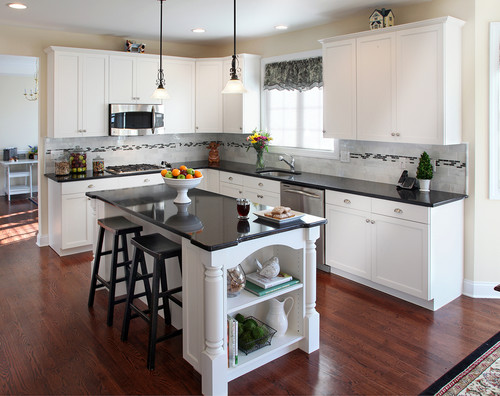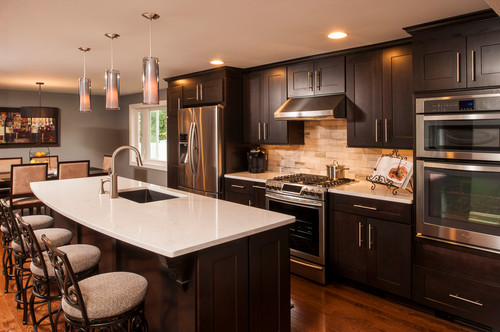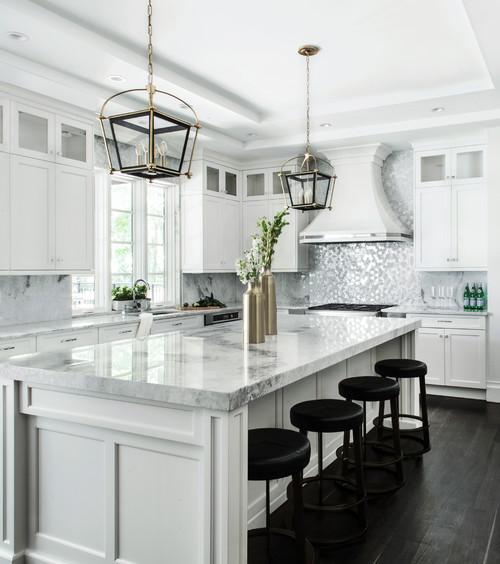3 Antimicrobial Countertop Options for Your Home

Investing in antimicrobial countertops protects against the growth of microorganisms, such as bacteria, mold and mildew. Because the kitchen contains food, moisture and a temperate climate, kitchen countertops are an ideal place for bacteria to flourish. Here are three countertop options to choose from when it comes to installing antimicrobial countertops in your kitchen or bathroom.
Antimicrobial Countertop Option #1: Quartz
Engineered quartz from renowned manufacturers like Caesarstone, Silestone, and MS International, among others, stands out as one of the most inherently antimicrobial countertop surfaces you can choose. This benefit is a result of how this product is made.
Engineered quartz is largely composed of natural quartz, an extremely hard substance that makes up about 90% of the counter material. This substance is paired with resins and polymers (as well as pigments, in some cases) to create a molded surface. Not only is the final product extremely durable and resistant to stains, chips, and cracks, with no sealing required, but it’s non-porous, which makes it easy to clean and resistant to the incursion of bacteria and other germs.
Daily cleaning is also simple when it comes to quartz. Since you don’t have to worry about food, bacteria, mold, or other substances penetrating the surface, all you need is a damp sponge or cleaning cloth to wipe up spills and give your countertop a regular once-over. You can also use a mild cleanser like dish soap – just make sure to rinse it thoroughly afterward to avoid dulling the surface.
In addition, many homeowners find engineered quartz just as attractive as alternatives like natural stone, especially since poured slabs have no seams and it can be made to look like a variety of similar materials, including marble and granite.
Consider how the black quartz in this traditional kitchen adds modern appeal. It could easily be mistaken for Black Galaxy granite.
Or there’s the pale Cambria quartz used in this contemporary New York kitchen, which resembles Carrara or Calacatta marble.
What’s true for all of these quartz surfaces is that they are non-porous and antimicrobial, contributing to a safer home environment, when properly cleaned and sanitized.
Antimicrobial Countertop Option #2: Natural Stone
Despite the fact that natural stone is more porous than engineered quartz surfaces, it’s still naturally resistant to microbes like bacteria, viruses, and other germs. When you add proper sealing and regular cleaning and maintenance, you’ll find that natural stone options like marble, granite, and quartzite offer similar antimicrobial properties as quartz due to their non-porous properties.
An effective cleaner for granite is warm, soapy water and a sponge (1-to-3 drops of dishwashing detergent is fine). Wipe the counter down with soapy water, then rinse with clean, warm water. You can also use a 50:50 solution of isopropyl alcohol and water. Never use vinegar, Windex or bleach on granite. Frequent uses of these acidic substances will dull the granite and weaken the sealant.
You’ll find that there are nearly endless options to choose from when it comes to natural stone countertops that not only enhance cleanliness but elevate the beauty and value of your home.
Take for example, this eye-catching variegation of granite used in this tone-on-tone, transitional New York kitchen.
Or if you prefer the simple elegance and subtle, organic texture displayed by the quartzite in this dynamic New York kitchen setting, you’ll certainly enjoy the fact that sealed and well-maintained natural stone keeps your home safe, even as it enhances your home interior.
Antimicrobial Countertop Option #3: Porcelain
Porcelain is quickly becoming a popular alternative to natural stone and engineered quartz, thanks to incredible resilience, versatility and beauty. But is porcelain stone antimicrobial? In fact, it has been found to naturally reduce the presence of bacteria like S. aureus and E. coli by roughly 80%, on average.
This engineered surface, made from kaolinite clay is molded and baked at 2,500 degrees. This pressure and heat creates an extremely compact and durable counter surface that is non-porous, like quartz, which helps to impede the proliferation of germs and makes it easy to clean and sanitize. Everyday cleaning is simple — no special cleaning products required. You can wipe up stains and spills using a household cleaner or simple soap and water. This surface is also resistant to detergent and chemicals, so you do not run the risk of damaging the surface with a harsh cleaner.
Similar to quartz, it can be made to mimic a wide range of natural stone surfaces or display other colors and designs. The porcelain countertops displayed in this contemporary kitchen, may easily be mistaken for marble, for example.
While everyday cleaning is an important part of protecting your investment and ensuring a clean home, the countertop material you choose can also play an important role. There are plenty of antimicrobial countertop options that provide the value and appeal homeowners are looking for, along with the antimicrobial protection properties to keep your household safe and healthy.
Academy Marble & Granite’s team is ready to help you with your home project. Schedule a consultation at one of our locations today.







